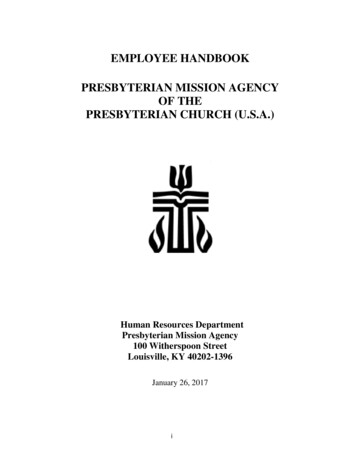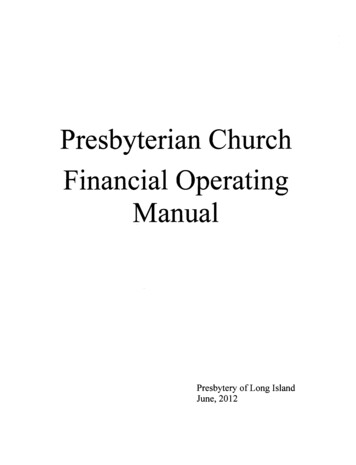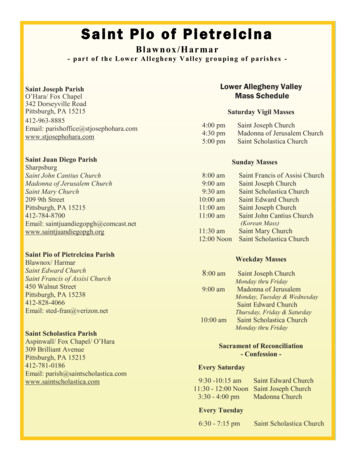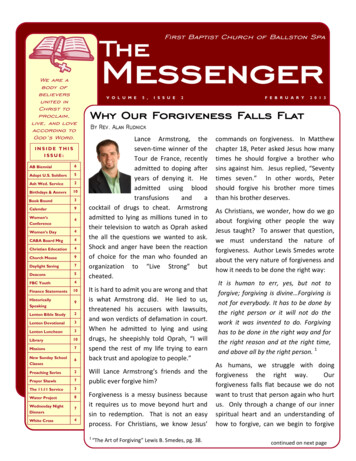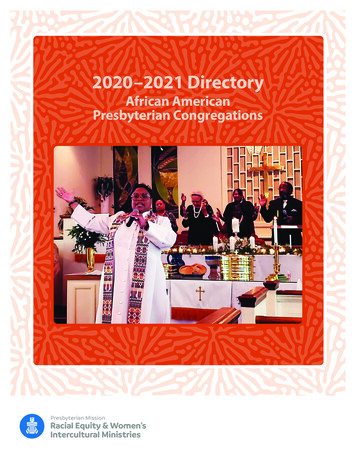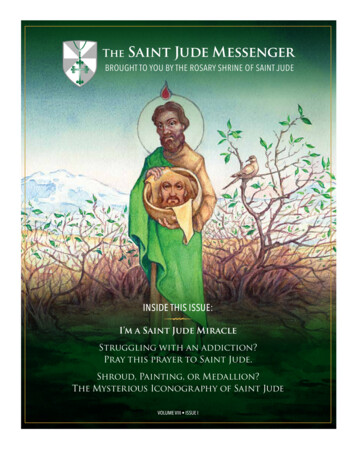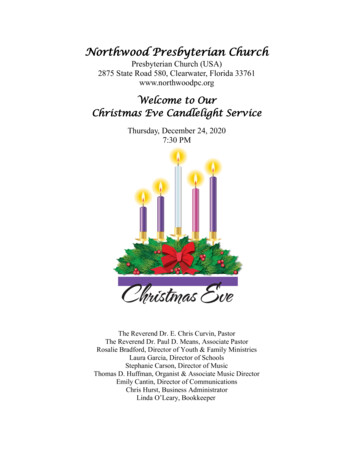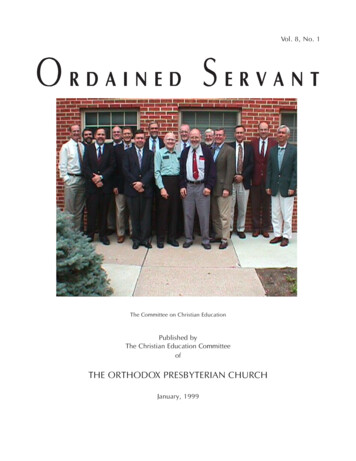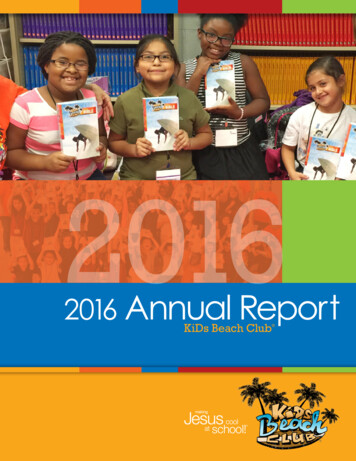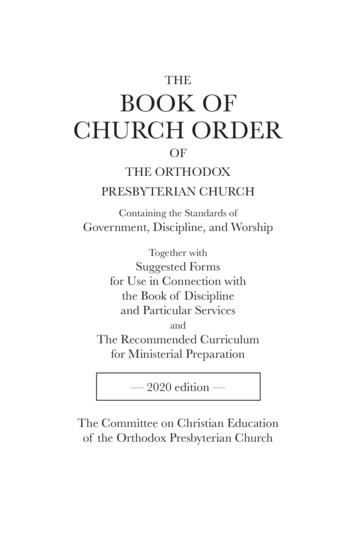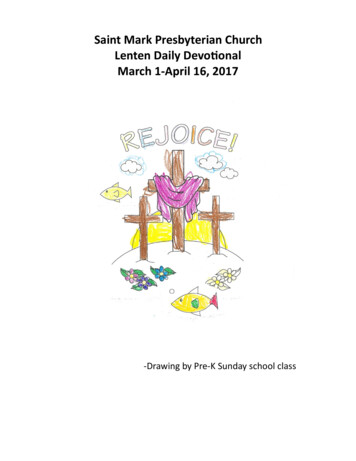
Transcription
Saint Mark Presbyterian ChurchLenten Daily Devo8onalMarch 1-April 16, 2017-Drawing by Pre-K Sunday school class
Dear Saint Mark Family,It is with great joy that we share with you the daily reflec@ons and prayers of SaintMark members and friends of all ages to accompany you on your journey thisLenten season. On these pages, you will find stories of love, peace, hope, andforgiveness.Each entry lists a daily scripture reading and excerpt from this reading, as well as areflec@on and prayer. At the conclusion of the reading for each day, we invite youto offer a prayer for the writer, as we grow in community with each other.As we prepare our hearts for the resurrec@on of the Lord, let us walk together.—Jennifer Carr, Jocelyn Callister and Rev. Shelby Etheridge HarastyMarch 2017
March 1Psalm 51 1-17 (NRSV)10 Create in me a clean heart, O God, and put a new and right spirit within me.11 Do not cast me away from your presence, and do not take your holy spirit from me.12 Restore to me the joy of your salva@on, and sustain in me a willing spirit.Reflec8onShared and personal experiences over the course of @me have led me to the prac@ce ofincessant prayer. This was not a conscious plan to pray this way. In fact, I had previously thought it to beimprac@cal to pray without ceasing. Over the years as a member of our church family, I have beentrusted/blessed with the opportunity to pray for others. I have also been in that dark place, wheresiXng alone I finally learned to listen. Listening is a term that for many is spoken of lightly, there aremany ways to listen, but only one that results in hearing.At a very low point in my life, I heard the direc@on for me to pray for me, too. Pray always andwithout ceasing.I have learned to pray with a willing spirit for the ability to listen, to hear and to pray. It is a dailychallenge to listen. It is with gra@tude and thanksgiving we can hear what the spirit is saying at allamidst the noise of the day. So, yes I find that whenever I am not listening with the intent to hear, Imust refocus my thoughts, re-center. I know that if every faith and na@on would pray at the same @methat the peace of Christ would be with us and would be demonstrated by our thoughts and deeds, itwould be so.PrayerGrant us the courage to prac@ce listening and hearing with a willing spirit. Teach us todemonstrate our faith in prayer through our ac@ons and deeds. In Jesus’ name. Amen.—Sharon Banks Tarr
March 2Isaiah 58:6-12the poin@ng of the finger, and speaking6 Is not this the fast that I choose:wickedness,10 if you pour yourself out for the hungryto loose the bonds of wickedness,to undo the straps of the yoke,and sa@sfy the desire of the afflicted,to let the oppressed go free,then shall your light rise in the darknessand to break every yoke?and your gloom be as the noonday.7 Is it not to share your bread with the hungry11 And the Lord will guide you con@nuallyand bring the homeless poor into your house;and sa@sfy your desire in scorched placeswhen you see the naked, to cover him,and make your bones strong;and not to hide yourself from your own flesh?and you shall be like a watered garden,8 Then shall your light break forth like the dawn,like a spring of water,and your healing shall spring up speedily;whose waters do not fail.12 And your ancient ruins shall be rebuilt;your righteousness shall go before you;the glory of the Lord shall be your rear guard.you shall raise up the founda@ons of many9 Then you shall call, and the Lord will answer;genera@ons;you shall cry, and he will say, ‘Here I am.’you shall be called the repairer of the breach,If you take away the yoke from your midst,the restorer of streets to dwell in.Reflec8onStop the wheel.Breathe.Look Him in the eyes.Who am I?Why am I here?To be salt, to remind the world the tas@ness of being loved.To be light, to smile the Sun out.To be I.PrayerDear Father in Heaven, thank You for being the head of our conscience, for always stretchingout Your arms to receive us, for breaking our chains, paXng us on the back, and for always cheering uson. We are Your hands and feet. We share Your overflowing love with all who come our way. We do notwant to say a word unless it points the world back to You. Amen.—Arthur (grade 12), Iris (grade 1), and Li-Jen, hand in hand
2 Corinthians 5:20b – 6:10March 3We implore you on Christ’s behalf: Be reconciled to God. 21 God made him who had no sin to be sin for us, sothat in him we might become the righteousness of God. 6:1 As God’s co-workers we urge you not to receive God’sgrace in vain. 2 For he says, “In the @me of my favor I heard you, and in the day of salva@on I helped you.” I tellyou, now is the @me of God’s favor, now is the day of salva@on. 3 We put no stumbling block in anyone’s path, sothat our ministry will not be discredited. 4 Rather, as servants of God we commend ourselves in every way: ingreat endurance; in troubles, hardships and distresses; 5 in bea@ngs, imprisonments and riots; in hard work,sleepless nights and hunger; 6 in purity, understanding, pa@ence and kindness; in the Holy Spirit and in sincerelove; 7 in truthful speech and in the power of God; with weapons of righteousness in the right hand and in thelel; 8 through glory and dishonor, bad report and good report; genuine, yet regarded as impostors; 9 known, yetregarded as unknown; dying, and yet we live on; beaten, and yet not killed; 10 sorrowful, yet always rejoicing;poor, yet making many rich; having nothing, and yet possessing everything.Reflec8onCorinth was an important Greek city in the @me of the early Church. Although heavilyinfluenced by local thought, culture and polytheism, Corinth was not unlike a modern American city inthat it was also a mel@ng pot for other cultures and religions from various corners of the ancient world.Small wonder then, that the young church there had its share of problems. From Paul’s other wri@ngswe know that these problems included sexual immorality, and heated fac@onal disagreements as towhom they should follow most carefully to help them interpret and live out the Gospel. In this lemer,however, Paul simply exhorts the people to be reconciled to God through Jesus and receive the gracethat brings forgiveness and salva@on. He goes on to remind them of the hardships he has undergoneduring his ministry and the degree to which he’s been misunderstood and mistrusted, concluding thatalthough sorrowful, he constantly rejoices, although poor, he enriches many, and although des@tute inworldly terms, he possesses everything - presumably through God’s favor.There is much in this passage for 21st century Chris@ans living in a post-Chris@an society,such as ours. We olen need to be reminded that at its heart, Chris@anity is about beingreconciled to God through the gil of grace in Jesus’ sacrificial death. It is a simple idea thatanyone can grasp, and is offered freely, with no clear compulsion to do anything other thanaccept the gil. Yet in doing that, we become aware that we are called to reject the sin thatwould separate us from God, while ac@ng to help humanity and to reconcile the world to God,even in small ways, every day.Paul’s ministry is clearly notable for its influence and sacrifice but most people’s faithwalks are less spectacular, although just as blessed. I made my first stumbling steps towardsChris@an faith in my teens, con@nued to grow slowly in my twen@es, and have remainedcommimed – although struggling at @mes – to my faith through the years. But with greatermaturity and the wisdom of hindsight, I now see a more clear trajectory. It appears to me thatGod saw purpose in my seemingly insignificant life years ago and has con@nued to faithfullysustain and encourage me every day. Now, in my later years, that belief helps to spur me toserve God and my fellow human, as best I can.PrayerFather, we understand that we’re not all called to be great leaders in your church, yet we knowthat we can all do our part in reconciling people to you in Jesus. Help us to understand ourresponsibility to reach out to help our fellow human and in so doing to witness to your great gil ofgrace to us. This day, please help us to find opportuni@es to show your love in the world and thestrength to do so. In Jesus’ name, Amen.—Guy Roberts
March 4MaPhew 6: 1-6, 16-21Be careful not to prac@ce your righteousness in front of others to be seen by them. If you do, you willhave no reward from your Father in heaven.2 So when you give to the needy, do not announce it with trumpets, as the hypocrites do in thesynagogues and on the streets, to be honored by others. Truly I tell you, they have received theirreward in full. 3 But when you give to the needy, do not let your lel hand know what your right hand isdoing, 4 so that your giving may be in secret. Then your Father, who sees what is done in secret, willreward you.5 And when you pray, do not be like the hypocrites, for they love to pray standing in the synagogues andon the street corners to be seen by others. Truly I tell you, they have received their reward in full. 6 Butwhen you pray, go into your room, close the door and pray to your Father, who is unseen. Then yourFather, who sees what is done in secret, will reward you.16 And when you fast, do not look gloomy like the hypocrites, for they disfigure their faces that theirfas@ng may be seen by others. Truly, I say to you, they have received their reward. 17 But when you fast,anoint your head and wash your face, 18 that your fas@ng may not be seen by others but by your Fatherwho is in secret. And your Father who sees in secret will reward you.19 Do not lay up for yourselves treasures on earth, where moth and rust destroy and where thievesbreak in and steal, 20 but lay up for yourselves treasures in heaven, where neither moth nor rustdestroys and where thieves do not break in and steal. 21 For where your treasure is, there your heartwill be also.Reflec8onThose of us "of a certain age" remember the Seinfeld TV show. In one of my favorite episodesGeorge Costanza lel a big @p in the @p jar at a fast food place, but the person behind the counterturned away just as he was puXng in the @p and didn't see him put the money in. He was upset thatshe didn't see his act of generosity, so he reached into the jar to retrieve the money. He wanted to putthe money in again when she was paying amen@on so he could impress her. Of course she turnedaround to see him with his hand in the @p jar and accused him of stealing her @ps. Comedy ensued.The problem was George didn't understand what Jesus is saying in Mamhew's gospel. The pointisn't to let the fast food person see that you just gave her a @p, and to bask in the compliments for yourgenerosity. The point is to do the right thing in such a way that nobody other than God can see. AsPaul writes in Ephesians 2:9, we are saved by faith, not by works, "so that no one can boast".PrayerLord, I am tempted to do good works so others can see and think bemer of me. You and onlyyou know my true nature. Help me to avoid the sin of pride, and to keep me focused not on impressingothers but to be the best I can be for you. Amen.—Mike Lutz
March 5MaPhew 4:1-11 (The Message)1-3 Next Jesus was taken into the wild by the Spirit for the Test. The Devil was ready to give it. Jesusprepared for the Test by fas@ng forty days and forty nights. That lel him, of course, in a state ofextreme hunger, which the Devil took advantage of in the first test: “Since you are God’s Son, speak theword that will turn these stones into loaves of bread.”4 Jesus answered by quo@ng Deuteronomy: “It takes more than bread to stay alive. It takes a steadystream of words from God’s mouth.”5-6 For the second test the Devil took him to the Holy City. He sat him on top of the Temple and said,“Since you are God’s Son, jump.” The Devil goaded him by quo@ng Psalm 91: “He has placed you in thecare of angels. They will catch you so that you won’t so much as stub your toe on a stone.”7 Jesus countered with another cita@on from Deuteronomy: “Don’t you dare test the Lord your God.”8-9 For the third test, the Devil took him to the peak of a huge mountain. He gestured expansively,poin@ng out all the earth’s kingdoms, how glorious they all were. Then he said, “They’re yours—lock,stock, and barrel. Just go down on your knees and worship me, and they’re yours.”10 Jesus’ refusal was curt: “Beat it, Satan!” He backed his rebuke with a third quota@on fromDeuteronomy: “Worship the Lord your God, and only him. Serve him with absolute single-heartedness.”11 The Test was over. The Devil lel. And in his place, angels! Angels came and took care of Jesus’ needs.Reflec8onUsing Eugene Peterson’s paraphrase, The Message, I’m struck by two points in this passage thatI had not no@ced before now. One has to do with how Jesus responds to Satan’s tempta@ons and theother comes at the conclusion of the passage.In the depths of his tempta@ons Jesus shows us he’s done his rabbinical homework. Even withthe crushing burdens of fa@gue and hunger, Jesus firmly resists Satan’s challenges to Jesus’ iden@ty byquo@ng Deuteronomy. He knows the laws of Moses! And he had those Mosaic laws in mind as herecalled the command to worship only one God and to keep God’s commandments by doing what wasright. Obedience to God in this case, meant that God’s way was the only way, no mamer howcompelling Satan’s way must have seemed to him at the @me.We know that Jesus is both fully divine and fully human. Being fully divine means Jesus couldhave turned stones into bread without any goading from Satan. He could easily have relieved his ownmisery using his divine power. When we recognize that Jesus obeyed God rather than turn away fromGod’s teachings, we can understand that Jesus authen@cally intercedes for us because he has sufferedand been tempted as we are too. Knowing that Jesus was fully human means he has experienced allthat we humans experience – including tempta@on. A line from our hymn “Out of Deep UnorderedWater” summarizes this idea beau@fully: “Life is hallowed by the knowledge God has been this waybefore.” We can know, then, that no mamer the pain or tempta@on, God has not only experienced it,but God suffers alongside us. We are not alone!The second startling point illustrated by Peterson’s paraphrase of this lesson comes followingSatan’s departure and the end of this round of tempta@ons. Angels come to care for Jesus, unbidden.Isn’t it startling to realize the angels assist Jesus not because he called on them, but because God, whowitnessed and suffered with Jesus throughout the tempta@ons, met Jesus’ needs at the most cri@cal@me? God reveals his faithfulness to us by taking care of Jesus. This act reminds us that God will alwayskeep His promises to care for His people. I don’t see this as sugges@ng a kind of asce@c approach togeXng what we really need, but instead as showing God’s faithfulness to those who put their trust inHim. Fred Craddock explains this as “to the extent that Jesus’ tempta@on serves as a model for theChris@an, it might teach that to be a child of God means to have a trus@ng rela@onship to God thatdoes not ask for miraculous excep@ons to the limita@ons of an authen@c human life.” Jesus did just
that. Our task then is to learn the stories and lessons of Jesus’ life through our scriptures well enoughthat they will always help point us toward God’s way the way Jesus has already walked and all alongthe way that he will walk with us.PrayerGod of every season and place, help us learn well the stories of Jesus so that we may not live infear, or be tempted to turn from God. Instead, may we see new mercies through all that God hasprovided for us and be at peace.—Rachel Kaufmann
Psalm 32Blessed is the onewhose transgressions are forgiven,whose sins are covered.2 Blessed is the onewhose sin the Lord does not count againstthemand in whose spirit is no deceit.3 When I kept silent,my bones wasted awaythrough my groaning all day long.4 For day and nightyour hand was heavy on me;my strength was sappedas in the heat of summer.5 Then I acknowledged my sin to youand did not cover up my iniquity.I said, “I will confessmy transgressions to the Lord.”And you forgavethe guilt of my sin.March 66 Therefore let all the faithful pray to youwhile you may be found;surely the rising of the mighty waterswill not reach them.7 You are my hiding place;you will protect me from troubleand surround me with songs of deliverance.8 I will instruct you and teach you in the way youshould go;I will counsel you with my loving eye on you.9 Do not be like the horse or the mule,which have no understandingbut must be controlled by bit and bridleor they will not come to you.10 Many are the woes of the wicked,but the Lord’s unfailing lovesurrounds the one who trusts in him.11 Rejoice in the Lord and be glad, you righteous;sing, all you who are upright in heart!Reflec8onFor the longest @me, I felt uncomfortable with what is the crux of our Chris@an faith. I also feltsecretly ashamed of that feeling. Sacrifice, blood, death, Atonement—in all of its forms—have alwaysmade me feel deeply unsemled. I didn’t understand it. I didn’t comprehend how, in the Old Testament,death and blood of animals had to rou@nely make up for the sins of humans. I didn’t get how Godcould or had to sacrifice His only son for us in the ul@mate Atonement. Couldn’t He, our mercifulCreator, just forgive us and reconcile with us, sparing Christ’s suffering and bloody death? Why did themoment of forgiveness, redemp@on, and reconcilia@on with humankind have to be associated withblood and death, and not life? Perhaps I was being “like a horse or a mule” who “can’t understandanything” (Psalm 32:9). Perhaps I was trying to understand it through my intellect and not through myfaith.As my Chris@an faith matured, I understood that I was just hung up on the wrong part of theevent. God, in his mercifulness, helped me understand. He helped me focus on the fact that GodHimself, in Christ’s flesh, died for us paying for our sins so we could share in His glorious, eternal life.There is no greater sacrifice, no greater love. I was simplis@cally focusing on death, while missing thepoint that God became human and lived like us so he could understand our suffering, and then died sothat we could have a shot at having eternal life. I was focusing on the darkness of death, and not onthe light of life and resurrec@on.“Blessed is the person whose lawless acts are forgiven,” says the Psalmist, for “their sins havebeen taken away.” My transgressions were forgiven right there, at the cross, taken away. From thebeginning, God’s ul@mate wish has been to reconcile with us. Through Christ’s death, He has ini@atedthis reconcilia@on and He is wai@ng for us to reach out, to understand and accept Christ’s sacrifice and,with repentant hearts, embrace Grace.This Lent, as I reflect on my faith journey and prepare for Easter, I thank God for illumina@ng myheart and, limle by limle, given me understanding of His great mysteries. Psalm 32 says, “I will guide you
and teach you the way you should go. I will give you good advice and watch over you with love” (Psalm32:8). All I need to do is surrender with abandonment and “trust in Him”. It sounds simple but I olenstruggle with this.The representa@on of the event at the Calvary will always encompass death, life, and blood.Blood as a sign of death, and blood as a sign of life. As my Chris@an faith con@nues to mature, I havelearned to focus on the light and life in Christ’s blood, be grateful for what God has done for me, andmake peace with the mysteries of Atonement.PrayerDear God, Thank you for reconciling with us at the cross and every day, despite of ourtransgressions. Thank you for your forgiveness and Grace. In our daily lives, “when troubles come like aflood,” please meet us in higher ground and remind us to always hand over control to you. During Lentand always, illumine us to fully understand the eternal dimension of Atonement and of your eternallove. Amen.—Bebel Delgado
March 7Romans 5: 12-21Therefore, just as sin came into the world through one man, and death came through sin, and so deathspread to all because all have sinned— 13 sin was indeed in the world before the law, but sin is notreckoned when there is no law. 14 Yet death exercised dominion from Adam to Moses, even over thosewhose sins were not like the transgression of Adam, who is a type of the one who was to come.15 But the free gil is not like the trespass. For if the many died through the one man’s trespass, muchmore surely have the grace of God and the free gil in the grace of the one man, Jesus Christ, aboundedfor the many. 16 And the free gil is not like the effect of the one man’s sin. For the judgment followingone trespass brought condemna@on, but the free gil following many trespasses brings jus@fica@on. 17If, because of the one man’s trespass, death exercised dominion through that one, much more surelywill those who receive the abundance of grace and the free gil of righteousness exercise dominion inlife through the one man, Jesus Christ.18 Therefore just as one man’s trespass led to condemna@on for all, so one man’s act of righteousnessleads to jus@fica@on and life for all. 19 For just as by the one man’s disobedience the many were madesinners, so by the one man’s obedience the many will be made righteous. 20 But law came in, with theresult that the trespass mul@plied; but where sin increased, grace abounded all the more, 21 so that,just as sin exercised dominion in death, so grace might also exercise dominion through jus@fica@onleading to eternal life through Jesus Christ our Lord.Reflec8onThere is bad news and good news, says the Apostle Paul in effect as he writes to the Jewishfollowers of Jesus in the great city of the Roman first century CE (AD) world. The bad news, says Paul, isthat sin con@nues to be rampant in our @me as it has been since Adam. The good news is that we havefound at last our Messiah in Jesus whose life and death amest to the gracious and forgiving nature ofGod.This is indeed a sweeping statement, somewhat like the broad stroke of an ar@st in a hurry! Notonly that, but Paul understands this good news to apply also to the many Gen@les who are alsoamracted to it. And to those Jews who object to sharing this message with non-adherents to the Torah,Paul insists that Jesus has ushered in a new age in which all humanity can par@cipate, that the Kingdomof Grace is the free gil of God to a wicked and corrupt world. One need not subscribe to a set of laws(even good laws) to be “jus@fied” as an acceptable child of God. Real unity can include diversity amonggroup members who may differ in background as together they live out their vision and hope for aworld where love conquers hate and life conquers death.How “current” this message of the great theologian and missionary of the Early Church turnsout to be for our 21st century world!PrayerOh for a world where everyone respects each other’s waysWhere love is lived and all is done with jus@ce and with praise.We welcome one world family and struggle with each choice.That opens us to unity and gives our vision voice.Amen.—Louise Winfield
Joel 2: 1-2, 12-17Blow the trumpet in Zion;sound the alarm on my holy hill.Let all who live in the land tremble,for the day of the Lord is coming.It is close at hand—2 a day of darkness and gloom,a day of clouds and blackness.Like dawn spreading across the mountainsa large and mighty army comes,such as never was in ancient @mes.----------12 “Even now,” declares the Lord,“return to me with all your heart,with fas@ng and weeping and mourning.”13 Rend your heartand not your garments.Return to the Lord your God,for he is gracious and compassionate,slow to anger and abounding in love,and he relents from sending calamity.14 Who knows? He may turn and relentMarch 8and leave behind a blessing—grain offerings and drink offeringsfor the Lord your God.15 Blow the trumpet in Zion,declare a holy fast,call a sacred assembly.16 Gather the people,consecrate the assembly;bring together the elders,gather the children,those nursing at the breast.Let the bridegroom leave his roomand the bride her chamber.17 Let the priests, who minister before the Lord,weep between the por@co and the altar.Let them say, “Spare your people, Lord.Do not make your inheritance an object ofscorn,a byword among the na@ons.Why should they say among the peoples,‘Where is their God?’”Reflec8onThe word for the verb “repent” in Hebrew is one of my favorite Hebrew words. It’s ‘shuv,’ and itcan also be translated as “to turn.” I like this because it gives a concrete image to an abstract concept.When God is asking us to repent, God is asking us to turn toward God. I like the image of turningbecause it makes me think that when we repent, we leave something behind. We leave behind thosesins, those things we have to repent for, and we make a conscious effort to turn toward God. Thosethings that separated us from God, they can no longer be in our line of sight.When we repent, we literally turn around, we stop walking away from God and start walkingtowards God. Turning to God with our whole heart, as God begs us to do through the prophet Joel, is tochange our minds, reconsider our ac@ons, to orient ourselves wholly toward God.The prophet calls for repentance, and not just for the whole person. God wants the whole city,the whole people, the whole na@on of Israel to join in this repentance and worship. Repentancehappens in our hearts, but it also happens in community.PrayerGracious God, help us to turn away from sin and hatred and fear and to turn toward you. Helpus to orient our lives so that we face you and all that you have to offer us. As we move through thisseason of Lent, help us to leave behind that which separates us from you and from each other. May wealways be turning toward you, O God. Amen.—Rev. Shelby Etheridge Harasty
March 9Acts 3: 1-10One day Peter and John were going up to the temple at the @me of prayer—at three in the alernoon. 2Now a man who was lame from birth was being carried to the temple gate called Beau@ful, where hewas put every day to beg from those going into the temple courts. 3 When he saw Peter and John aboutto enter, he asked them for money. 4 Peter looked straight at him, as did John. Then Peter said, “Look atus!” 5 So the man gave them his amen@on, expec@ng to get something from them.6 Then Peter said, “Silver or gold I do not have, but what I do have I give you. In the name of Jesus Christof Nazareth, walk.” 7 Taking him by the right hand, he helped him up, and instantly the man’s feet andankles became strong. 8 He jumped to his feet and began to walk. Then he went with them into thetemple courts, walking and jumping, and praising God. 9 When all the people saw him walking andpraising God, 10 they recognized him as the same man who used to sit begging at the temple gate calledBeau@ful, and they were filled with wonder and amazement at what had happened to him.Reflec8onThe passage represents, to us, that faith in God has the power to change. A person may haveemo@onal obstacles in their life to being the person they want to be. Or perhaps there are obstacles fora person to find joy or apprecia@on for someone in their daily life. This passage teaches us that theseobstacles are surmountable and can be overcome. You can be the person you want to be or have therela@onship you want to have. Belief in God has the power to change you, improve you, and give youstrength when you are emo@onally crippled.PrayerGod, hear our yearning to live in faith, to be true followers of your way, to be the person weknow we can be. Diminish those obstacles we see as so insurmountable, so that we can realize ourpoten@al. Amen.—Alison Dewey and Brian Hooker
March 10Psalm 19 (NIV)1The heavens declare the glory of God;the skies proclaim the work of his hands.2Dayaler day they pour forth speech;Night aler night they display knowledge.3Thereis no speech or language where their voice is not heard.voice goes out into all the earth,Their words to the ends of the world.4TheirIn the heavens he has pitched a tent for the sun,5which is like a bridegroom coming forth from his pavilion,like a champion rejoicing to run his course.6Itrises at one end of the heavens and makes its circuit to the other;Nothing is hidden from its heat.7Thelaw of the Lord is perfect, reviving the soul.The statutes of the Lord are trustworthy, making wise the simple.8The precepts of the Lord are right, giving joy to the heart.The commands of the Lord are radiant, giving light to the eyes.9The fear of the Lord is pure, enduring forever.The ordinances of the Lord are sure and altogether righteous.10They are more precious than gold, than much pure gold;They are sweeter than honey, than honey from the comb.11By them is your servant warned;in keeping them is your great reward.
12Whocan discern his errors?Forgive my hidden faults.13Keep your servant also from willful sins;may they not rule over me.Then I will be blameless, innocent of great transgression.14Maythe words of my mouth and the medita@on of my heart be pleasing in your sight,O Lord, my Rock and my Redeemer.PrayerLord, I sing your praises. Your world is awesome and makes us breathless. Your laws are perfect.Forgive me for not adhering to them bemer, but help me to come closer each day. I am here to pleaseyou and bring glory to you. Amen.—Jane Karakashian
March 111 Corinthians 1: 18-25For the message of the cross is foolishness to those who are perishing, but to us who are being saved itis the power of God. 19 For it is wrimen:“I will destroy the wisdom of the wise; the intelligence of the intelligent I will frustrate.”20 Where is the wise person? Where is the teacher of the law? Where is the philosopher of this age?Has not God made foolish the wisdom of the world? 21 For since in the wisdom of God the worldthrough its wisdom did not know him, God was pleased through the foolishness of what was preachedto save those who believe. 22 Jews
Each entry lists a daily scripture reading and excerpt from this reading, as well as a reflec@on and prayer. At the conclusion of the reading for each day, we invite you to offer a prayer for the writer, as we grow in community with each other. . Lent Devotional 2017 .
